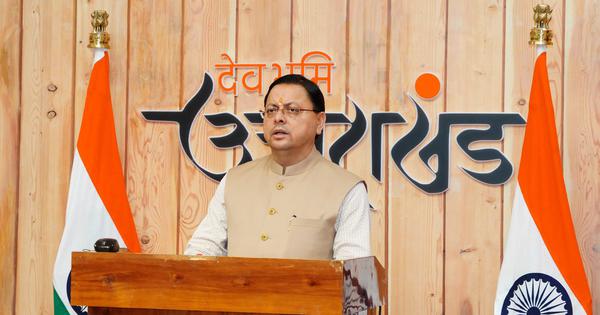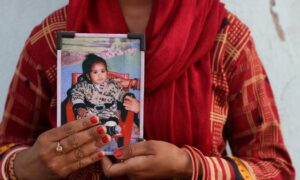
The stricter provisions of the Uttarakhand Freedom of Religion (Amendment) Bill approved by the state cabinet on August 13 increase the penalties for “forced” religious conversions up to life imprisonment and, notably, ban all “propaganda” about conversions over digital media.
This means that any online content on social media, messaging apps or websites can be treated as conversion propaganda.
It risks throwing open a Pandora’s Box for internet vigilantes who will have one more tool to crack down on anything that fits the ambiguous definition of “promotion” or “incitement” to religious conversion.
Violators face heavy fines and prison terms from three to 10 years, which could go up to 20 years or life in extreme cases.
The act was introduced in 2018 “to provide freedom of religion” by prohibiting religious conversions effected “by misrepresentation, force, undue influence, coercion, allurement or by any fraudulent means or by marriage”.
The new bill “includes a broad definition of inducement – gifts, cash/goods benefits, employment, free education, promises of marriage, hurting religious sentiments, or glorifying another religion”, according to media reports. These sweeping provisions risk criminalising lawful speech, social cohesion and the online expression of secularism and beliefs.
The provisions not only echo similar anti-conversion laws in other Bharatiya Janata Party-ruled states – such as Uttar Pradesh and Madhya Pradesh – but go further by explicitly criminalising digital speech about religion.
The authorities justify this by pointing to examples of “conversion schemes”: for instance, the Agra police recently claimed to have uncovered a criminal “conversion racket” that media reports said “operated through social media, online games, encrypted communication platforms, and the dark web” targeting young women. Uttarakhand’s government argues that banning digital incitement will help curb such online luring.
The overreach of the law
The law leaves the term “digital propaganda” broad and undefined. It presumably means any attempt to influence religious belief via the internet. Such expansiveness risks clashing with constitutional guarantees under Articles 19(1)(a) and 25, which protect the right to speak, believe and practise religion freely.
Even non-coercive acts, such as social media greetings or an online invitation to a religious festival, could be seen as “conversion propaganda” and claimed to be an inducement to convert.
An example of this risk would be the October 2020 advertisement for the Tanishq jewellery brand celebrating an interfaith family: a Muslim mother-in-law hosting a Hindu daughter-in-law’s baby shower. The 40-second commercial depicted “a beautiful confluence of two different religions, traditions and cultures”, said the tagline.
Instead of drawing praise about its message of social cohesion, the ad triggered online outrage. Hindutva supporters accused Tanishq of “hurting the religious sentiments” of Hindus and promoting “love jihad” – the conspiracy theory that Muslim men are entrapping Hindu women in romantic relationships only so they can force them into converting to Islam. Facing threats – one Tanishq store in Gujarat had to put up an apology – the company withdrew the ad.
The backlash reflected how the claims of “love jihad” have been weaponised through anti-conversion laws to disproportionately target Muslim men and interfaith couples, often on baseless complaints.
Uttarakhand’s new digital clause makes it perilously easy to criminalise even the context around such relationships. Direct messages, posts about interfaith relationships or wedding announcements can now be cast as “incitement” or “propaganda”.
Under Uttarakhand’s new law, material like the Tanishq ad could be scrutinised or even targeted, landing its creators in legal trouble. The amendments carry far-reaching consequences for India’s diverse social fabric. Vague terms like “inducement” and “propaganda” give wide discretion to the authorities and even vigilante groups.
Brands, artists and creators are likely to resort to self-censorship, fearing not just boycotts but legal prosecution. Even ordinary acts, such as posting about faith or running online support groups for people who have converted out of choice or people who wish to know or understand a religion further, could be miscast as inducements.
By treating “digital propaganda” like a crime and pairing it with sweeping police powers, Uttarakhand’s amendments risk turning the internet into an evidentiary trap for interfaith couples and a censorship zone for secular, pro-freedom-of-religion speech.
Across states, anti-conversion laws have already disproportionately ensnared couples in interfaith relationships. Uttarakhand’s new digital clause heightens that risk. Sharing a marriage certificate online or interfaith ceremony photos or a few lines about the spiritual reasons for marriage could be characterised as “glorifying another religion” or booked as an “inducement”.
There is also the larger question of freedom of religion as enshrined under the Indian Constitution. If an adult uploads a YouTube video in which they explain why they changed faith or if a legal-aid organisation provides help over Whatsapp for religious converts, such actions can be framed as “promotion” or “incitement” to conversion.
Marriage under India’s Special Marriage Act, 1954, which is often used by interfaith couples, is fraught with obstacles: these include a mandatory 30-day notice period and the requirement that the couple’s address and personal details be displayed on registrar offices’ public notice boards. That is why many interfaith couples find it easier for one partner to convert for the sake of marriage.
Deliberate vagueness
But now, Uttarakhand’s amended law could criminalise social media posts that defend the freedom to convert for marriage or love.
Instagram pages that highlight stories of love across caste, religious and other social chasms could also fall into the net. Even activists in that state who criticise anti-conversion laws could be censored, if officials equate advocacy with “propaganda”.
Uttarakhand’s move also sits within a wider political project such as the Uniform Civil Code, which mandates that all couples in live-in relationships register with the local authorities.
The amended law as well as a slew of other states’ anti-conversion laws, have all effectively been used to criminalise something as personal as religious belief and the right to choose one’s practice of faith, all enshrined in India’s Constitution.
This latest amendment takes the stifling of personal liberties to new territory online. A funny Instagram reel discussing invitations to non-Muslims for an iftar feast, or a church choir’s song, or an interfaith couple’s wedding celebration – it’s difficult to say whether these could also fall under the ambit of “promotion” of conversion, given the ways the internet outrage machine works.
In the interest of both social harmony and free expression, policymakers and the judiciary must reconsider the law, so that the net cast against “digital propaganda” does not continue to erode the very freedoms it claims to protect.
Nidah Kaiser is a researcher in the department of politics at SOAS, University of London. Sabah Gurmat is a journalist and writer based in New Delhi.
This article first appeared on Scroll.in
📰 Crime Today News is proudly sponsored by DRYFRUIT & CO – A Brand by eFabby Global LLC
Design & Developed by Yes Mom Hosting






